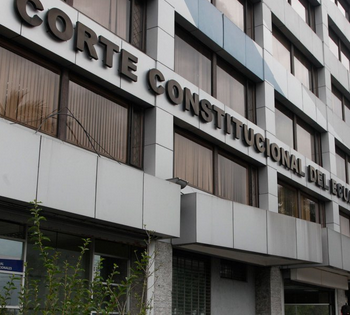Ecuador’s Constitutional Court ruled Saturday night that the government’s current state of emergency is unconstitutional. The 30-day emergency was declared by President Lenín Moreno on December 20 based on fears that holiday events and a new, more contagious Covid-19 variant would lead to increased cases of the virus and overload the country’s healthcare system.

Ecuador’s Constitutional Court ruled Saturday night that the current state of emergency is unconstitutional.
Among other things, the state of emergency imposed a nationwide nighttime curfew, put restrictions on the operation of private vehicles and the sale of liquor, and restricted all gatherings to less than 10 people.
The court ruled that the emergency order was a violation of civil liberties that “did not conform to constitutional standards.”
A number of legal and health experts had predicted the court’s decision when Moreno declared the emergency, claiming pandemic conditions are improving in Ecuador and that the order was based on unsubstantiated projections. They pointed out that the number of Covid-19 cases, hospitalizations and deaths has been in steady decline since July.
Business organizations applauded the court’s decision but expressed regret that it did not come sooner. “It’s the correct response but we needed it two weeks ago,” says Jaime Iglesias, spokesman for a Quito association of restaurant and hotel owners. “The declaration shut down our business for Christmas and New Years and was the nail in the coffin for many or our members. Now we hear that the government’s action was illegal but the news comes too late for many.”
Quito attorney André Benavides agrees, and says Moreno’s reason for the emergency order was questionable from the beginning. “This is definitely the proper decision,” he says. “The court made it clear in August that it would not grant a new declaration and recognized the need for a return to a level of normalcy to provide employment and business opportunities to the population,” he said.

Trend of new Covid-19 cases in Ecuador since July. Numbers on the top are new cases per week. Numbers at the bottom indicate weeks since the pandemic was declared in March.
Many medical professionals also questioned the basis for the emergency order. “The government says ‘follow the science’ but in this case they clearly did not,” says Paúl Cárdenas, professor of microbiology and researcher at the San Francisco de Quito University. “The pandemic conditions in Ecuador are improving and the numbers — and the science — prove it so why introduce new restrictions? They cannot be justified.”
In its decision, the high court said “… it is not indifferent to the consequences of the response capacity of the public health system if the trend of hospitalization continues to increase, nor to the seriousness of the possible effects of the new mutation of the viruses, referred to in the decree in question.” It added, however, that the government did not provide the “proper justification” to deny citizens their civil liberties.
The court added that the government is justified in all efforts to implement and enforce rules that protect the public health as long as they do not infringe on constitutional rights.

